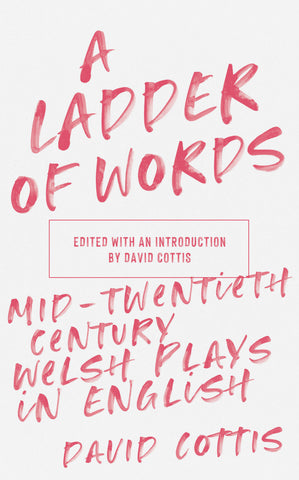VOLUME 2 OF TWENTIETH-CENTURY WELSH PLAYS IN ENGLISH
EDITED BY DAVID COTTIS
When the north Wales-born actor and playwright Emlyn
Williams performed his one-man show about Dylan
Thomas, the critic Richard Findlater described him as
‘unravelling a ladder of words’ which he then climbs up,
and pulls the spectators after him. Findlater called this
‘the Cambrian rope trick’, highlighting the process by which
writers, and Welsh writers in particular, use the power of
language to take an audience into an unfamiliar world.
Williams performed his one-man show about Dylan
Thomas, the critic Richard Findlater described him as
‘unravelling a ladder of words’ which he then climbs up,
and pulls the spectators after him. Findlater called this
‘the Cambrian rope trick’, highlighting the process by which
writers, and Welsh writers in particular, use the power of
language to take an audience into an unfamiliar world.
This volume brings together three Welsh plays from the
middle of the twentieth century: Rhondda Roundabout
(1939) by Jack Jones, from his own novel, a panoramic view
of politics, religion, sport and music in the Valleys, described
by the Sunday Times critic James Agate as ‘too good for
the West End’, The Druid’s Rest (1944) by Emlyn Williams,
a semi-autobiographical comedy about the fantasy life of
an over-imaginative boy who suspects that an Englishman
on a walking tour is actually a famous murderer, and After
My Fashion (1952) by Diana Morgan, in which the widows
of men who died on a Tibetan expedition discover untold
secrets when approached by a film company, inspired by the
Cardiff-born author’s own experiences as a screenwriter at
Ealing Studios, which also formed the basis for the recent
novel and film Their Finest.
middle of the twentieth century: Rhondda Roundabout
(1939) by Jack Jones, from his own novel, a panoramic view
of politics, religion, sport and music in the Valleys, described
by the Sunday Times critic James Agate as ‘too good for
the West End’, The Druid’s Rest (1944) by Emlyn Williams,
a semi-autobiographical comedy about the fantasy life of
an over-imaginative boy who suspects that an Englishman
on a walking tour is actually a famous murderer, and After
My Fashion (1952) by Diana Morgan, in which the widows
of men who died on a Tibetan expedition discover untold
secrets when approached by a film company, inspired by the
Cardiff-born author’s own experiences as a screenwriter at
Ealing Studios, which also formed the basis for the recent
novel and film Their Finest.
Edited and with an introduction by David Cottis, and
following on from A Dirty Broth, which looked at the
pioneers of the Welsh theatre in English, A Ladder of Words
explores the period either side of the Second World War,
a time when Welsh playwrights enjoyed unprecedented
commercial success, both at home and in the West End.
David Cottis is Lecturer in Scriptwriting at Middlesex University,
and a theatre writer/director. He lives in London and Cardiff.
and a theatre writer/director. He lives in London and Cardiff.

